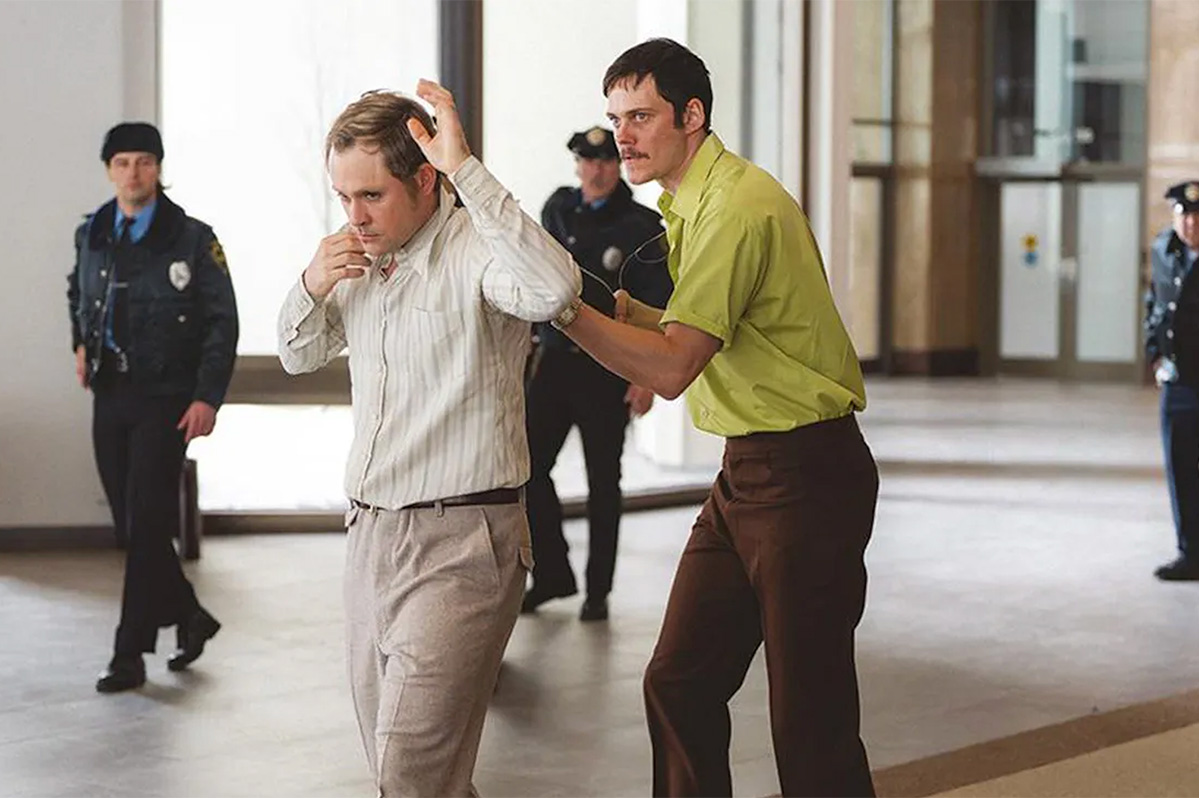Movies
Qualley shines in sexy neo noir ‘Honey Don’t’
Second installment in ‘lesbian B-movie trilogy’ arrives

Before judging “Honey Don’t” – the second installment of a “lesbian B-movie trilogy” from filmmaker Ethan Coen and co-writer/spouse Tricia Cooke, which opened last weekend to wildly mixed reviews – it might be useful to brush up on what exactly is meant by the term “B-movie.”
A designation originating in the days of classic Hollywood’s studio system, it was coined to refer to the kind of lower-budget, less-prestigious “filler” movies that were produced to accompany the main attraction in the then-standard double feature format. Customarily written off by critics of the day as unworthy of serious attention, they nevertheless provided a proving ground for ambitious young film artists, and some of the classic-era films deemed most influential today – particularly within the film noir category, which seemed a particularly convenient fit for B-movie treatment – came out of it.
Later, when the studio system began to implode during the cultural shift of the 1960s, the same kind of cheaply produced films evolved into the grungy, countercultural “exploitation” movies which entertained a drive-in generation that had learned to see outside the bubble of conventional expectations. These movies were wild, imaginative things that often pushed boundaries with gratuitous excesses of sex, violence, and authority-challenging attitude, and while they sometimes dared to tackle controversial themes under the guise of sensationalist escapism, they, too, were largely written off as “trash” by most contemporaneous tastemakers. They also inspired a whole new wave of cinema artists, from Quentin Tarantino to Ari Aster, who would build critically-lauded careers with work that not only emulated the over-the-top extremity of their style, but treated it like the high-concept art that it was.
With that in mind, “Honey Don’t” plays like both a campy spoof and an artful homage. Embracing the generic-yet-classic film noir “private eye” formula, it upsets the cart right from the outset by flipping the gender of its central archetype to offer the stylish, savvy, and no-nonsense detective Honey O’Donahue (Margaret Qualley) as the story’s hard-boiled protagonist. Set in a nebulously contemporary Bakersfield (which feels like a picturesque metaphor for blighted-and-corrupt smalltown America), it follows her as the unexpected demise of a would-be-client draws her into a mystery with connections to a charismatic local church leader (Chris Evans); finding an ally and love interest in butch bad-girl police officer “MG” (Aubrey Plaza), she uncovers a sinister thread of predatory corruption that may threaten even her own family – specifically her beloved niece (Talia Ryder), whose relationship with an abusive boyfriend places her at particular risk of becoming a victim of whatever twisted mind is operating behind the town’s string of mysterious deaths and disappearances.
It’s a wild-and-wooly, ludicrous tale, a self-aware exercise in style which winds its bemusedly hard-edged mystery around a core that mirrors both the cynicism and the romance of its hard-boiled neo-noir inspirations. Full of red herrings, implausible coincidences, and blatant plot holes, it plays into a pitch-black sense of irony (a Coen trademark, after all) as it twists its way through a near-absurd landscape of banality, disaffection, and casual amorality, weaving a labyrinthine narrative that leads to multiple dead ends before delivering an over-the-top climactic confrontation and a tauntingly murky resolution. Along the way, it indulges in near-baroque levels of cartoonish-but-grim violence, graphic sex, and bleakly misanthropic character study, all of which highlight the themes of misogyny, cyclical violence, casual cruelty, and corrupted humanity that underscore the whole tactically perverse plot.
All of that might be hard to digest for audiences who are looking for a mystery story, who come to it for the queer representation or as a nostalgic throwback with a sexy twist. “Honey Don’t” offers those things, to be sure, but it packages them in a hyper-violent, iconoclastic reinvention of “detective noir” fiction and claims feminine space in a genre almost always dominated by males. It’s a movie designed to challenge the status quo, to disrupt conventions, to push past comfortable boundaries and shake us up; threads lead nowhere, circumstances change unexpectedly in an instant, and the archetypal wise-cracking private dick is now a sex-positive, out-and-proud “lipstick” lesbian. We’re prepared for a neo-noir movie to exist in a bleak and meaningless universe, but all that is a lot to take if you’re not expecting it.
Which means this “Honey” might not be sweet for everyone – but those with a taste for it will find a lot to appreciate.
Coen (directing solo from brother Ethan for the second time) exerts a more consistent control over tone with this outing than with last year’s “Drive-Away Dolls,” while still maintaining the kind of unpredictable anarchy that ties it to the pulpy thrillers that inspired it. The heat-blasted Bakersfield setting gives the movie a sense of place that feels at once distinctive and universal, and there’s a clear love of cinema that manifests in subtle nods to numerous classic movies of the past.
He also populates the movie with a smart, game cast who seem to embrace the chance to play outside the lines of their usual image. Plaza takes her familiar edge of vaguely hostile irony to new heights as Honey’s butch and antisocial “girl Friday,” and Evans clearly relishes the opportunity to go against type as a smug, slimy, self-satisfied pastor who reads like the polar opposite of his “Captain America” image. Lera Abrova is electrifying as a mysterious French femme fatale, while Charlie Day provides a great comic foil as an obliviously smitten police detective who can’t quite get it through his head that Honey likes girls; Gabby Beans makes for yet another strong, intelligent female character as Honey’s assistant and confidant.
It’s Margaret Qualley’s movie, though. She gives a star performance as Honey, providing a welcome and much-needed portrait of fully empowered female heroism. She can outthink, outmaneuver, and see through any opponent she encounters, and she can look great doing it; she’s a genuine badass – and on top of all that, she’s queer, too! Qualley takes all of that and makes it convincing, proving once more that she’s an actor well on her way to becoming an icon.
As for the movie itself, we won’t pull punches: it’s the kind of outside-the-box film that people are either going to love or hate; so if you have a problem with any of what we just wrote about it, maybe you should just skip it. For everybody else, it’s a sexy, thrilling, funny and artfully filmed little gem, perfect for late summer enjoyment.
Movies
‘Pillion’ director on bikers, BDSM, and importance of being seen
‘We put a lot of thought and effort into how we depicted the community’

One of the highlights of last week’s Mid-Atlantic Leather Weekend came not on the dance floor, but in a movie theater. In a new partnership, the independent film studio A24 brought its leather-clad new film “Pillion” — not yet in wide release — to D.C. for special showings for the MAL crowd.
“Pillion,” a term for the motorcycle passenger seated behind the driver, delves into the complicated relationship between an introverted, quiet Londoner Colin (Harry Melling) who embarks on a journey finding himself while entering into a sub relationship with a new Dom named Ray (Alexander Skarsgård) he meets during Christmas.
It’s writer-director Harry Lighton’s feature-length debut, sharing Skarsgård’s impossibly toned physique with both Colin and audiences, and offering an eye into the BDSM community by an LGBTQ director for the general public. This from a studio that also just released a movie about ping-pong starring Timothée Chalamet.
The Washington Blade was able to catch a screening at Regal Gallery Place on Jan. 18, hosted by MAL and Gary Wasdin, executive director, Leather Archives & Museum. The Blade also had a chance to interview Lighton about the experience.
Blade: How did you get involved in this film, especially as this is your directorial debut?
Lighton: I was sent “Box Hill,” the novel on which “Pillion” is based, by Eva Yates (the head of film at the BBC). I’d spent years working on a sumo film set in Japan, and then suddenly that became impossible due to the pandemic so I was miserable. And then I read this book that I found bracing, funny, moving. All the good things.
Blade: Are you involved with the leather community? Did you draw on any personal experiences or make connections with the community?
Lighton: I’m involved in the wrestling scene but not the leather community. So I spent lots of time with people who are [in the community] during the writing process, and then ended up casting a bunch of them as bikers and pillions in the film. They were incredibly generous to myself, Harry, and Alex with their knowledge and experiences. We have them to thank for lending credibility to the world on screen.
Blade: What kind of reception have you received at film festivals and with the LGBTQ community? Was it what you imagined?
Lighton: Obviously not everyone’s going to like the film — for some people it’ll be too explicit, for some not explicit enough; some people will feel seen, some won’t. But the general reaction’s been extremely positive so far. If I’m honest I thought it would divide opinion more.
Blade: How was it working with the actors?
Lighton: I had a lot of respect for both of them going in, and wondered if that might make me a bit too deferential, a bit too Colin-coded. But besides being extremely talented, they’re both lovely. And committed. And fun! With my shorts I always felt a bit out of my depth working with actors, but here I discovered a real love for it.
Blade: Turning to the plot, the parents are pretty supportive, especially Colin’s dad. How did you decide to draw his parents? What does it mean to show parents with nuanced viewpoints?
Lighton: I wanted to reverse the typical parent-child dynamic in queer film, where parents go from rejecting to accepting their queer kid. We meet Colin’s parents actively pushing him toward a gay relationship. But when the relationship he lands on doesn’t meet her definition of healthy, his mum withdraws her acceptance. I wanted to ask: Are they projecting their romantic model onto their son, or do they have a legitimate concern for his wellbeing with Ray?
Blade: How did you decide to place the setting?
Lighton: Practically, we needed somewhere within reach of London. But I liked the idea that Colin, who lives life on the periphery, grew up on the edge of the capital. One of our producers, Lee Groombridge, grew up in and around Bromley and showed me all the spots. I loved the atmosphere on the high street, the markets, and the contrast between the high street and the idyllic park. And I thought it would be a funny place for Alexander Skarsgård to have settled.
Blade: What do you hope audiences take away from the film?
Lighton: There’s no one message. Different people will take different things from it. Personally, Colin inspires me to jump off cliffs, to push beyond my comfort zone because that’s where life begins. From Ray I get the courage to be ugly, to fly in the face of social convention if it doesn’t make you happy or it’s not built for you.
Blade: Talk about the soundtrack — especially the Tiffany “I Think We’re Alone Now” song.
Lighton: Skarsgård’s Ray has the surface masc-ness that comes with looking like a Viking. I wanted to combine that with details that indicate he’s been a part of gay culture and “I Think We’re Alone Now” is nothing if not a camp classic.
Blade: What does it mean to you to show the film at MAL?
Lighton: When I told the bikers from the film I was coming to MAL they practically wet themselves with excitement. We put a lot of thought and effort into how we depicted the community in the film and there’s so much variety, no two Masters or subs are the same, but seeing a theater full of men in leather laugh, cry, and clap for the film meant the world.
Movies
Van Sant returns with gripping ‘Dead Man’s Wire’
Revisiting 63-hour hostage crisis that pits ethics vs. corporate profits

In 1976, a movie called “Network” electrified American moviegoers with a story in which a respected news anchor goes on the air and exhorts his viewers to go to their windows and yell, “I’m mad as hell, and I’m not going to take this anymore!”
It’s still an iconic line, and it briefly became a familiar catch phrase in the mid-’70s lexicon of pop culture, the perfect mantra for a country worn out and jaded by a decade of civil unrest, government corruption, and the increasingly powerful corporations that were gradually extending their influence into nearly all aspects of American life. Indeed, the movie itself is an expression of that same frustration, a satire in which a man’s on-the-air mental health crisis is exploited by his corporate employers for the sake of his skyrocketing ratings – and spawns a wave of “reality” programming that sensationalizes outrage, politics, and even violence to turn it into popular entertainment for the masses. Sound familiar?
It felt like an exaggeration at the time, an absurd scenario satirizing the “anything-for-ratings” mentality that had become a talking point in the public conversation. Decades later, it’s recognized as a savvy premonition of things to come.
This, of course, is not a review of “Network.” Rather, it’s a review of the latest movie by “new queer cinema” pioneer Gus Van Sant (his first since 2018), which is a fictionalized account of a real-life on-the-air incident that happened only a few months after “Network” prompted national debate about the media’s responsibility in choosing what it should and should not broadcast – and the fact that it strikes a resonant chord for us in 2026 makes it clear that debate is as relevant as ever.
“Dead Man’s Wire” follows the events of a 63-hour hostage situation in Indianapolis that begins when Tony Kiritsis (Bill Skarsgård) shows up for an early morning appointment at the office of a mortgage company to which he is under crippling debt. Ushered into a private office for a one-on-one meeting with Dick Hall (Dacre Montgomery), son of the brokerage’s wealthy owner, he kidnaps the surprised executive at gunpoint and rigs him with a “dead man’s wire” – a device that secures a shotgun against a captive’s head that is triggered to discharge with any attempt at escape – before calling the police himself to issue demands for the release of his hostage, which include immunity for his actions, forgiveness of his debt, reimbursement for money he claims was swindled from him by the company, and an apology.
The crisis becomes a public spectacle when Kiritsis subjects his prisoner to a harrowing trip through the streets back to his apartment, which he claims is wired with explosives. As the hours tick by, the neighborhood surrounding his building becomes a media circus. Realizing that law enforcement officials are only pretending to negotiate while they make plans to take him down, he enlists the aid of a popular local radio DJ Fred Heckman (Colman Domingo) to turn the situation into a platform for airing his grievances – and for calling out the predatory financial practices that drove him to this desperate situation in the first place.
We won’t tell you how it plays out, for the sake of avoiding spoilers, even though it’s all a matter of public record. Suffice to say that the crisis reaches a volatile climax in a live broadcast that’s literally one wrong move away from putting an explosion of unpredictable real-life violence in front of millions of TV viewers.
In 1977, the Kiritsis incident certainly contributed to ongoing concerns about violence on television, but there was another aspect of the case that grabbed public attention: Kiritsis himself. Described by those who knew him as “helpful,” “kind,” and a “hard worker,” he was hardly the image of a hardened criminal, and many Americans – who shared his anger and desperation over the opportunistic greed of a finance industry they believed was playing them for profit – could sympathize with his motives. Inevitably, he became something of a populist hero – or anti-hero, at least – for standing up to a stacked system, an underdog who spoke things many of them felt and took actions many of them wished they could take, too.
That’s the thing that makes this true-life crime adventure uniquely suited to the talents of Van Sant, a veteran indie auteur whose films have always specialized in humanizing “outsider” characters, usually pushed to the fringes of society by circumstances only partly under their own control, and often driven to desperate acts in pursuit of an unattainable dream. Tony Kiritsis, a not-so-regular “Joe” whose fumbling efforts toward financial security have been turned against him and seeks only recompense for his losses, fits that profile to a tee, and the filmmaker gives us a version of him (aided by Skarsgård’s masterfully modulated performance) that leaves little doubt that he – from a certain point of view, at least – is the story’s unequivocal protagonist, no matter how “lawless” his actions might be.
It helps that the film gives us much more exposure to Kiritsis’ personality than could be seen merely during the historic live broadcast that made him infamous, spending much of the movie focused on his interactions with Hall (performed with equally well-managed nuance by Montgomery) during the two days spent in the apartment, as well as his dealings with DJ Heckman (rendered with savvy and close-to-the-chest cageyness by Domingo); for balance, we also get fly-on-the-wall access to the interplay outside between law enforcement officials (including Cary Elwes’ blue collar neighborhood cop) as they try to navigate a potentially deadly situation, and to the jockeying of an ambitious rookie street reporter (Myha’la) with the rest of the press for “scoops” with each new development.
But perhaps the interaction that finally sways us in Kiritsis’s favor takes place via phone with his captive’s mortgage tycoon father (Al Pacino, evoking every unscrupulous, amoral mob boss he’s ever played), who is willing to sacrifice his own son’s life rather than negotiate a deal. It’s a nugget of revealed avarice that was absent in the “official” coverage of the ordeal, which largely framed Kiritsis as mentally unstable and therefore implied a lack of credibility to his accusations against Meridian Mortgage. It’s also a moment that hits hard in an era when the selfishness of wealthy men feels like a particularly sore spot for so many underdogs.
That’s not to say there’s an overriding political agenda to “Dead Man’s Wire,” though Van Sant’s character-driven emphasis helps make it into something more than just another tension-fueled crime story; it also works to raise the stakes by populating the story with real people instead of predictable tropes, which, coupled with cinematographer Arnaud Potier’s studied emulation of gritty ‘70s cinema and the director’s knack for inventive visual storytelling, results in a solid, intelligent, and darkly humorous thriller – and if it reconnects us to the “mad-as-hell” outrage of the “Network” era, so much the better.
After all, if the last 50 years have taught us anything about the battle between ethics and profit, it’s that profit usually wins.
Movies
A ‘Battle’ we can’t avoid
Critical darling is part action thriller, part political allegory, part satire

When Paul Thomas Anderson’s “One Battle After Another” debuted on American movie screens last September, it had a lot of things going for it: an acclaimed Hollywood auteur working with a cast that included three Oscar-winning actors, on an ambitious blockbuster with his biggest budget to date, and a $70 million advertising campaign to draw in the crowds. It was even released in IMAX.
It was still a box office disappointment, failing to achieve its “break-even” threshold before making the jump from big screen to small via VOD rentals and streaming on HBO Max. Whatever the reason – an ambivalence toward its stars, a lack of clarity around what it was about, divisive pushback from both progressive and conservative camps over perceived messaging, or a general sense of fatigue over real-world events that had pushed potential moviegoers to their saturation point for politically charged material – audiences failed to show up for it.
The story did not end there, of course; most critics, unconcerned with box office receipts, embraced Anderson’s grand-scale opus, and it’s now a top contender in this year’s awards race, already securing top prizes at the Golden Globe and Critics’ Choice Awards, nominated for a record number of SAG’s Actor Awards, and almost certain to be a front runner in multiple categories at the Academy Awards on March 15.
For cinema buffs who care about such things, that means the time has come: get over all those misgivings and hesitations, whatever reasons might be behind them, and see for yourself why it’s at the top of so many “Best Of” lists.
Adapted by Anderson from the 1990 Thomas Pynchon novel “Vineland,” “One Battle” is part action thriller, part political allegory, part jet-black satire, and – as the first feature film shot primarily in the “VistaVision” format since the early 1960s – all gloriously cinematic. It unspools a near-mythic saga of oppression, resistance, and family bonds, set in an authoritarian America of unspecified date, in which a former revolutionary (Leonardo DiCaprio) is attempting to raise his teenage daughter (Chase Infiniti) under the radar after her mother (Teyana Taylor) betrayed the movement and fled the country. Now living under a fake identity and consumed by paranoia and a weed habit, he has grown soft and unprepared when a corrupt military officer (Sean Penn) – who may be his daughter’s real biological father – tracks them down and apprehends her. Determined to rescue her, he reconnects with his old revolutionary network and enlists the aid of her karate teacher (Benicio Del Toro), embarking on a desperate rescue mission while her captor plots to erase all traces of his former “indiscretion” with her mother.
It’s a plot straight out of a mainstream action melodrama, top-heavy with opportunities for old-school action, sensationalistic violence, and epic car chases (all of which it delivers), but in the hands of Anderson – whose sensibilities always strike a provocative balance between introspection, nostalgia, and a sense of apt-but-irreverent destiny – it becomes much more intriguing than the generic tropes with which he invokes to cover his own absurdist leanings.
Indeed, it’s that absurdity which infuses “One Battle” with a bemusedly observational tone and emerges to distinguish it from the “action movie” format it uses to relay its narrative. From DiCaprio (whose performance highlights his subtle comedic gifts as much as his “serious” acting chops) as a bathrobe-clad underdog hero with shades of The Dude from the Coen Brothers’ “The Big Liebowski,” to the uncomfortably hilarious creepy secret society of financially elite white supremacists that lurks in the margins of the action, Anderson gives us plenty of satirical fodder to chuckle about, even if we cringe as we do it; like that masterpiece of too-close-to-home political comedy, Stanley Kubrick’s 1964 nuclear holocaust farce “Dr. Strangelove,” it offers us ridiculousness and buffoonery which rings so perfectly true in a terrifying reality that we can’t really laugh at it.
That, perhaps, is why Anderson’s film has had a hard time drawing viewers; though it’s based on a book from nearly four decades ago and it was conceived, written, and created well before our current political reality, the world it creates hits a little too close to home. It imagines a roughly contemporary America ruled by a draconian regime, where immigration enforcement, police, and the military all seem wrapped into one oppressive force, and where unapologetic racism dictates an entire ideology that works in the shadows to impose its twisted values on the world. When it was conceived and written, it must have felt like an exaggeration; now, watching the final product in 2026, it feels almost like an inevitability. Let’s face it, none of us wants to accept the reality of fascism imposing itself on our daily lives; a movie that forces us to confront it is, unfortunately, bound to feel like a downer. We get enough “doomscrolling” on social media; we can’t be faulted for not wanting more of it when we sit down to watch a movie.
In truth, however, “One Battle” is anything but a downer. Full of comedic flourish, it maintains a rigorous distance that makes it impossible to make snap judgments about its characters, and that makes all the difference – especially with characters like DiCaprio’s protective dad, whose behavior sometimes feels toxic from a certain point of view. And though it’s a movie which has no qualms about showing us terrifying things we would rather not see, it somehow comes off better in the end than it might have done by making everything feel safe.
“Safe” is something we are never allowed to feel in Anderson’s outlandish action adventure, even at an intellectual level; even if we can laugh at some of its over-the-top flourishes or find emotional (or ideological) satisfaction in the way things ultimately play out, we can’t walk away from it without feeling the dread that comes from recognizing the ugly truths behind its satirical absurdities. In the end, it’s all too real, too familiar, too dire for us not to be unsettled. After all, it’s only a movie, but the things it shows us are not far removed from the world outside our doors. Indeed, they’re getting closer every day.
Visually masterful, superbly performed, and flawlessly delivered by a cinematic master, it’s a movie that, like it or not, confronts us with the discomforting reality we face, and there’s nobody to save it from us but ourselves.
-

 Real Estate4 days ago
Real Estate4 days agoConvert rent check into an automatic investment, Marjorie!
-

 Theater4 days ago
Theater4 days agoSwing actor Thomas Netter covers five principal parts in ‘Clue’
-

 District of Columbia4 days ago
District of Columbia4 days agoEleanor Holmes Norton ends 2026 reelection campaign
-

 Honduras4 days ago
Honduras4 days agoCorte IDH reconoce a Thalía Rodríguez como familia social de Leonela Zelaya



















